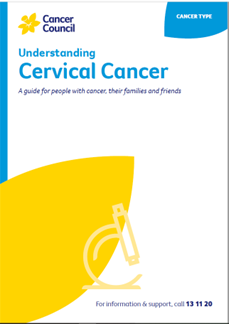- Home
- Cervical cancer
- Treatment
- Chemotherapy
Chemotherapy for cervical cancer
Chemotherapy uses drugs to kill cancer cells or slow their growth while causing the least possible damage to healthy cells.
Learn more about:
How chemotherapy is given
Chemotherapy may be given:
- in combination with radiation therapy as the main treatment for cervical cancer (chemoradiation)
- on its own or combined with targeted therapy.
The drugs are usually given through a vein (intravenously) during day visits to a hospital or clinic. Chemotherapy is usually given as a period of treatment followed by a break. This is called a cycle. The number of cycles you have depends on the type of cervical cancer and any other treatments you may be having. If you have chemotherapy without radiation therapy, you are likely to have up to 6 cycles (with a cycle every 3–4 weeks), though it may continue for longer.
Side effects of chemotherapy
The possible side effects vary according to the drugs given, how often you have treatment, your general health, and whether you have chemotherapy alone or chemoradiation. You may have nausea or vomiting; feel tired; or lose some hair from your body or head. Temporary or permanent menopause may also occur.
Chemotherapy may reduce the number of blood cells in your body, so you will have regular blood tests during treatment to monitor this.
Depending on the type of blood cells affected, you may feel very tired and be more likely to get infections. If your temperature rises to 38°C or above, go to the nearest hospital emergency department immediately.
Most side effects of chemotherapy are temporary, and your treatment team can help you to prevent or reduce them.
For more on this, see our general sections on Chemotherapy and Managing cancer side effects.
→ READ MORE: Targeted therapy for cervical cancer
Video: What is chemotherapy?
Watch this short video to learn more about chemotherapy, its role, how you get it, and possible side effects.
Podcast: Making Treatment Decisions
Listen to more of our podcast for people affected by cancer
More resources
Prof Martin Oehler, Director of Gynaecological Oncology, Royal Adelaide Hospital, and Clinical Professor, University of Adelaide, SA; Dawn Bedwell, 13 11 20 Consultant, Cancer Council QLD; Gemma Busuttil, Radiation Therapist, Crown Princess Mary Cancer Centre, Westmead Hospital, NSW; Dr Antonia Jones, Gynaecological Oncologist, The Royal Women’s Hospital and Mercy Hospital for Women, VIC; Angela Keating, Senior Psychologist, Royal Hospital for Women, NSW; Anne Mellon, Clinical Nurse Consultant – Gynaecological Oncology, Hunter New England Centre for Gynaecological Cancer, NSW; Dr Inger Olesen, Medical Oncologist, Andrew Love Cancer Centre, Barwon Health, Geelong, VIC; Dr Serena Sia, Radiation Oncologist, Fiona Stanley Hospital and King Edward Memorial Hospital, WA; A/Prof Megan Smith, Co-lead, Cervical Cancer and HPV Stream, The Daffodil Centre, Cancer Council NSW and The University of Sydney, NSW; Emily Stevens, Gynaecology Oncology Nurse Coordinator, Southern Adelaide Local Health Network, Flinders Medical Centre, SA; Melissa Whalen, Consumer.
View the Cancer Council NSW editorial policy.
View all publications or call 13 11 20 for free printed copies.

